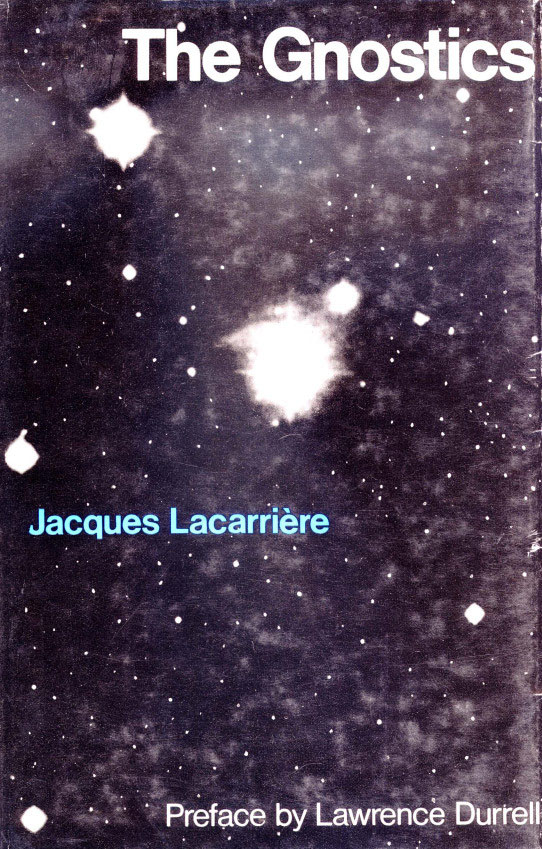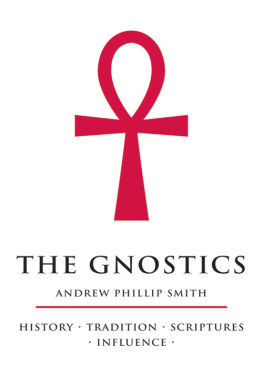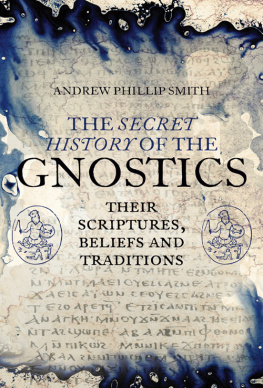Jacques Lacarriere - The Gnostics
Here you can read online Jacques Lacarriere - The Gnostics full text of the book (entire story) in english for free. Download pdf and epub, get meaning, cover and reviews about this ebook. genre: Science. Description of the work, (preface) as well as reviews are available. Best literature library LitArk.com created for fans of good reading and offers a wide selection of genres:
Romance novel
Science fiction
Adventure
Detective
Science
History
Home and family
Prose
Art
Politics
Computer
Non-fiction
Religion
Business
Children
Humor
Choose a favorite category and find really read worthwhile books. Enjoy immersion in the world of imagination, feel the emotions of the characters or learn something new for yourself, make an fascinating discovery.

- Book:The Gnostics
- Author:
- Genre:
- Rating:4 / 5
- Favourites:Add to favourites
- Your mark:
- 80
- 1
- 2
- 3
- 4
- 5
The Gnostics: summary, description and annotation
We offer to read an annotation, description, summary or preface (depends on what the author of the book "The Gnostics" wrote himself). If you haven't found the necessary information about the book — write in the comments, we will try to find it.
The Gnostics — read online for free the complete book (whole text) full work
Below is the text of the book, divided by pages. System saving the place of the last page read, allows you to conveniently read the book "The Gnostics" online for free, without having to search again every time where you left off. Put a bookmark, and you can go to the page where you finished reading at any time.
Font size:
Interval:
Bookmark:

Gnostics have always sought to know rather than to accept dogma and doctrine, often to their peril. This inquiry into Gnosticism examines the character, history, and beliefs of a brave and vigorous spiritual quest that originated in the ancient Near East and continues into the present day.
Lawrence Durrell writes, This is a strange and original essay, more a work of literature than of scholarship, though its documentation is impeccable. It is as convincing a reconstruction of the way the Gnostics lived and thought as D.H. Lawrences intuitive recreation of the vanished Etruscans.
JACQUES LACARRIRE was a French writer, born in Limoges. He studied moral philosophy, classical literature and Hindu philosophy and literature. Professionally, he was also a prominent critic, journalist, and essayist. A passionate admirer of ancient Greece and its mythology, his essay Lt grec (Greek Summer) was an immense popular success, as were his following classical works Maria of Egypt and Dictionnaire amoureux de la Grce (Dictionary for one who loves Greece). Lacarrires 1973 literary essay, Les Gnostiques, is also well respected for its insights into the early Christian religious phenomenon of Gnosticism.
Foreword by
LAWRENCE DURRELL
Translated from the French by
NINA ROOTES

1 The Perforated Veil
2 The Dark Fire
3 The Stranger
4 The Bodys Bastard Birth
5 The Highroads of Samaria
6 The Masters of Gnosis
7 Absolute Experience
8 The Ash and the Stars
9 The Impossible Mirror
10 The Worlds Wanderers
11 The Purity of the Mountains
This is a strange and original essaya sort of poetic meditation on the vanished Gnostics of Egypt whose total refusal to believe in the world as outlined by the Christian theologians led to their destruction both in Egypt and in Bosnia, and lastly at Montsgur,* that Thermopylae of the Gnostic soul. I should stress that this is more a work of literature than of scholarship, though its documentation is impeccable. It is as convincing a reconstruction of the way the Gnostics lived and thought as D. H. Lawrences intuitive recreation of the vanished Etruscans.
The documentation we possess on the Gnostics is almost as scanty as that on the Etruscans and much of it comes from the opposition, so to speak, from the Church Fathers. Lacarrire has used his sources with skill and honesty and this essay is of a burning topicality to a world which is also playing at Gnosticismthe pathetic cockroach world of the anti-hero with his anti-memoirs, not to mention his anti-poetry. How noble in comparison with this shallow hippie defeatism is the grand poetic challenge of the Gnostics. They refused to countenance a world which was less than perfect, and they affronted the great lie of Lucifer-Mammon with the hopeless magnificence of the Spartan three hundred.
All that we need to know about the author is that he is a wanderer and a poet; he is neither a scholar nor a journalist. The Indians would call him a searcherand indeed he has spent a considerable time in both India and Egypt and has studied the languages and landscapes of both; in the latter country it is impossible not to be struck by the history of these obliterated sects which clustered around the central idea of Gnosticism and which were finally scattered to the four winds of heaven by the true Christians, the anthropophagous elect of heaven in whose mental universe we now liveon the gold-standard of brotherly love. Lacarrire has given us a Cuvier-like reconstruction of the great Gnostic refusal of the lie, and their refusal to share the world of that lie with its religious leaders. The courage of this despair is poetic in the highest degree and this splendid poem renders it full justice.
LAWRENCE DURRELL
Eighteen centuries separate us from the Gnostics. Eighteen centuries during the course of which wars, persecutions and massacres, causing the deaths of thousands, have amply justified the total suspicion in which they held this world and the creatures that inhabit it. In everything that contemporary history sets before our eyesthe ever more blatant contempt for the individual man, the fallacy of ideologies, the wars or military interventions openly carried on for the profit of the combined interests of capitalism and socialism, the daily erosion of liberty and the fascination of violencein all this, a Gnostic of today would see nothing more than the magnified image of the dramas which were familiar to him, and the inevitable outcome of that everlasting outrage, the very existence of the world and of humanity as they are.
Who then were these people, lucid enough to look at creation with eyes stripped of all consoling self-deceptions, sensitive enough to feel, in all its unbearable extremity, the anguish of an eternity forever promised and forever denied, sincere enough to accept in their own lives all the implications of this total rejection of the world, and to behave, everywhere and at all times, as unsubjugated outsiders?
The term Gnostic is vague, encompassing several distinctly different meanings. But, historically speaking, it acquired a particular meaning during the early centuries of our era. On the Eastern shores of the Mediterranean, in Syria, Samaria and Egypt, at the moment when Christianity was feeling its way, and when so many prophets and messiahs were travelling the high roads of the Orient, founding short-lived communities here and there, certain men called Gnostics, that is to say men who know, were also setting up important communities, grouped around various masters and female initiates of a teaching that was radically different from all the others.
For the moment, I can do no more than sketch in the broad outlines of this complex, fascinating message, which will be drawn in greater detail throughout the text of the book. Gnosis is knowledge. And it is on knowledgenot on faith or beliefthat the Gnostics rely in order to construct their image of the universe and the inferences they drew from it: a knowledge of the origin of things, of the real nature of matter and flesh, of the destiny of a world to which man belongs as ineluctably as does the matter from which he is constituted. Now this knowledge, born out of their own meditations or from the secret teachings which they claim to have had from Jesus or from mythical ancestors, leads them to see the whole of material creation as the product of a god who is the enemy of man. Viscerally, imperiously, irremissibly, the Gnostic feels life, thought, human and planetary destiny to be a failed work, limited and vitiated in its most fundamental structures. Everything, from the distant stars to the nuclei of our body-cells, carries the materially demonstrable trace of an original imperfection which only Gnosticism and the means it proposes can combat.
But this radical censure of all creation is accompanied by an equally radical certainty which presupposes and upholds it: the conviction that there exists in man something which escapes the curse of this world, a fire, a spark, a light issuing from the true Godthat distant, inaccessible stranger to the perverse order of the real universe; and that mans task is to regain his lost homeland by wrenching himself free of the snares and illusions of the real, to rediscover the original unity, to find again the kingdom of this God who was unknown, or imperfectly known, to all preceding religions.
Font size:
Interval:
Bookmark:
Similar books «The Gnostics»
Look at similar books to The Gnostics. We have selected literature similar in name and meaning in the hope of providing readers with more options to find new, interesting, not yet read works.
Discussion, reviews of the book The Gnostics and just readers' own opinions. Leave your comments, write what you think about the work, its meaning or the main characters. Specify what exactly you liked and what you didn't like, and why you think so.











